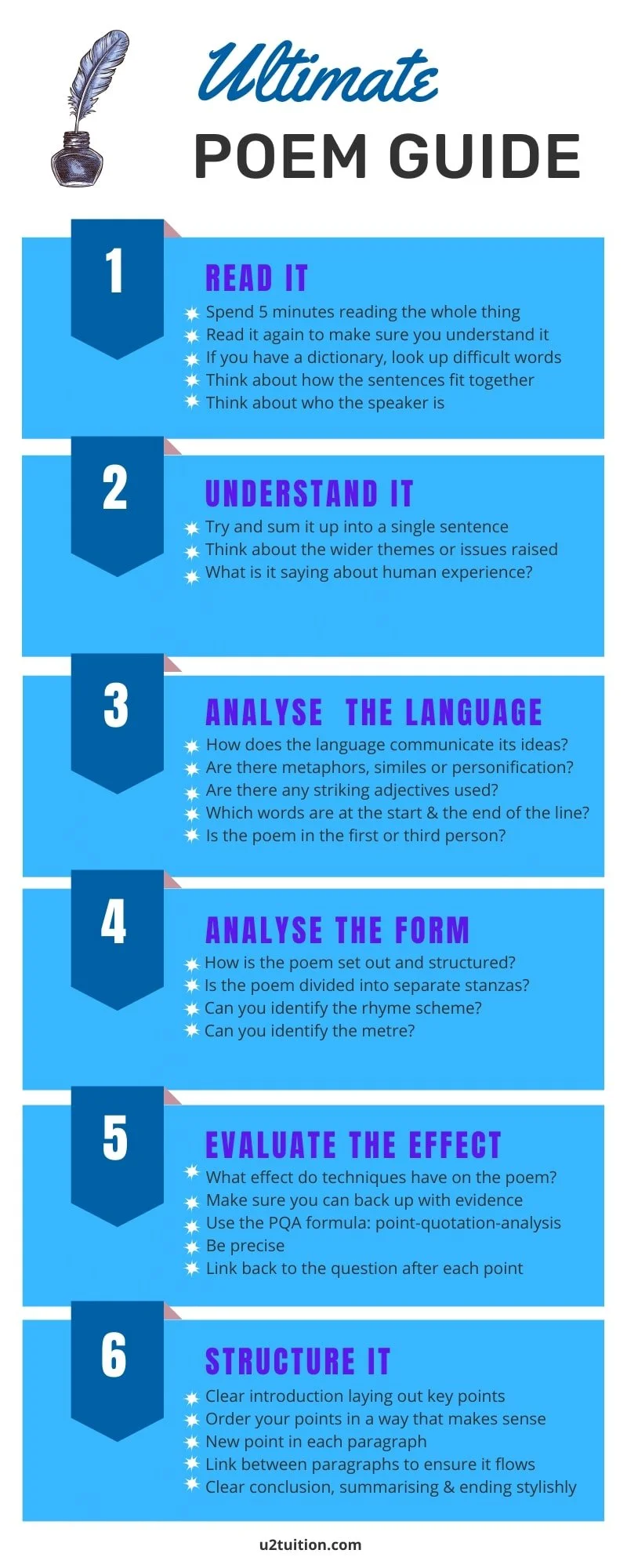Our Guide to Improving your GCSE Poetry Analysis
What is GCSE poetry analysis and when do I need it?
Analysis involves examining something in a detailed way and breaking it down into its constituent parts to understand how it works. So, when you’re asked to analyse a poem, you’re being asked to deconstruct it; this means explaining its message and exploring how the language, structure and form communicate that message. For GCSE poetry analysis, you will generally be expected to respond to both poetry you are familiar with as well as unseen poems (ones you haven’t prepared for). This guide will build your confidence in your GCSE poetry analysis skills so that you can excel in your GCSE exams.
Analysing Poetry - GCSE: Where to Begin?
The first step when you are analysing a poem is pretty straightforward: read it. Spend about five minutes reading through the whole thing, and then read it again to make sure you understand each word. Look up unfamiliar words in a dictionary and think about how the sentences fit together. Think about who the ‘speaker’ is.
Next steps
Once you’ve read through the poem twice, you’re ready to think about what the poem might be about. Try and sum up the poem into a single sentence; for example, you might think, ‘this poem is about moving to a new country’ or ‘this poem is about life in the city’.
Then, when you’ve understood the content of the poem, you’re ready to think about the wider themes or issues which it raises. So, a poem about moving to a new country might have themes of loneliness or alienation. Think broadly about what the poem is saying about human experience.
Delving deeper: Building Skills for GCSE Poetry Analysis
Language
Now that you’re confident that you’ve grasped the message and overriding theme(s) of the poem, think about how the language of the poem communicates those ideas. Go through the poem slowly, line by line, and think about the poet’s choice and positioning of words. Here are some starting points:
Is there any figurative language, such as metaphors, similes or personification?
Are there any striking adjectives used? Think about where the poet pairs up words which don’t usually go together; for example, the phrase ‘blissful light’ would be worth commenting on because light isn’t usually described as ‘blissful’, so it grabs our attention.
Which words are at the start and the end of the line? The poet will often use the positioning of words to add emphasis to them.
Are there any superlatives used?
Are the verbs in the past, present or future tense?
Is the poem in the first or third person?
As you’re identifying these linguistic features, examine what the effect of them is. How does the language make you feel? How does it relate to the broader issues of the poem?
Thinking about the specific effect on the poem you’re analysing is crucial to improving your GCSE poetry analysis as it keeps your close analysis grounded in a broader argument about the poem.
Form
Think about how the poem is set out and structured. Just as with the linguistic analysis, think about the effect of form to help you improve your GCSE poetry analysis
Is the poem divided into separate stanzas? Are the stanzas all the same size?
Does it rhyme? Can you identify the rhyme scheme? (For example, ABAB means that alternating lines rhyme, and AABB means that the lines fall into rhyming couplets).
Is the poem a sonnet? (Sonnets have 14 lines).
Can you identify the metre? For example, iambic pentameter means that there are five ‘unstressed’ syllables and five ‘stressed’ syllables per line.
Analysing Poetry GCSE: Writing your Response
Now that you’ve spent some time analysing the language and form of the poem and have examined how these contribute to the overall effect of the poem, you’ll have a detailed sense of how the poem functions. This means that when you discuss or write about the poem, you’ll be able to back up each point you make with a specific textual example. Use the PQA formula: point-quotation-analysis (also known as PEA: Point-evidence-analysis). The point of analysis is being precise in your discussion of the poem, and this will help you to appreciate the poet’s craft in generating ideas through language.
Words to describe the effect of language techniques:
Animates.
Makes vivid/ visual.
Lively.
Creates tension.
Creates suspense.
Dramatic.
Creates a gloomy/ positive/ melancholy/ peaceful/ noisy/ relaxed/ thoughtful/ tense/ joyful/ energetic/ sad/ dark/ warm/ mellow/ comical/ romantic/ violent/ celebratory/ harmonious/ dreamy/ animated/ cold/ playful/
nostalgic/ humorous atmosphere.Comedy/ humour.
Appeal to our senses.
Sympathy.
Poetic.
Terms to indicate how the poet conveys effect:
Suggests.
Demonstrates.
Shows.
Illustrates.
Emphasises/ highlights/ underlines. - Creates a ................. atmosphere.
Appeals to...
Allows the reader to...
Adds to...
Now you have all you need to analyse that knotty poem. Remember, meaning can be found in the most innocuous of words, and returning to the same piece of work over multiple days can be a good way to refine and hone your craft. So what are you waiting for? Dig out that dusty copy of The Waste Land and get started!
Looking For a Specialist English Tutor to Help Improve Your Written and Analytical skills?
If you are interested in support for your GCSE English Language or Literature papers or general Creative Writing endeavours, why not check out our offerings on the GCSE page and book a free consultation to discuss how we can boost your chance of success. We have a large team of predominantly Oxbridge-educated English tutors who are well-placed to develop students’ written skills, teaching how to structure writing, and the literary and rhetorical techniques that this requires.
The Journey to English Excellence
Navigating the path to excellence in English at GCSE is an adventure we embark on together! Here's how we make it happen:
1) Tailored Tutor Selection: We handpick an Oxbridge graduate, specialised in GCSE English, whose credentials align with your needs. Their CVs are at your disposal for review, ensuring the perfect match. We also provide options, each with varying qualifications and rates, so you can choose the ideal tutor.
2) Your Personalised Start: Embark with us through a 1.5-hour informal assessment session. Here, your tutor will dive into your strengths, weaknesses, and current performance levels. Post-assessment, we furnish you with a detailed feedback report and ensure your satisfaction with your chosen English tutor. Together, we set the course for your future sessions.
3) The Journey Unfolds: Beyond the first session, your tutor curates a comprehensive plan, tailored to your syllabus, covering all the essential papers, texts, and topics. We don't just stop at content; we equip you with the tools for effective exam techniques, ensuring you check all the right boxes in mark schemes. Our Oxbridge-educated tutors are more than educators; they are mentors who inspire and ignite your passion for English. Following each session, we provide feedback reports. You or your parent/ guardian can directly liaise with your tutor to schedule sessions, aligning with your unique schedule.
Let's embark on your path to English excellence together. Connect with us today, and let your literary journey begin!




